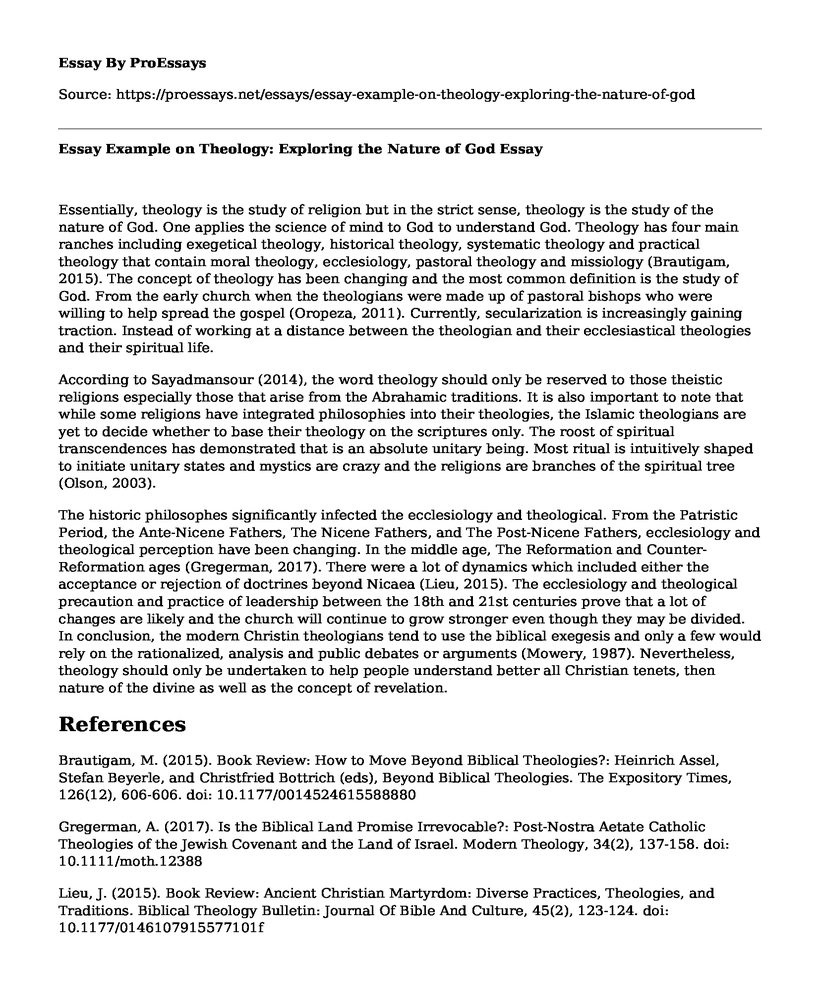Essentially, theology is the study of religion but in the strict sense, theology is the study of the nature of God. One applies the science of mind to God to understand God. Theology has four main ranches including exegetical theology, historical theology, systematic theology and practical theology that contain moral theology, ecclesiology, pastoral theology and missiology (Brautigam, 2015). The concept of theology has been changing and the most common definition is the study of God. From the early church when the theologians were made up of pastoral bishops who were willing to help spread the gospel (Oropeza, 2011). Currently, secularization is increasingly gaining traction. Instead of working at a distance between the theologian and their ecclesiastical theologies and their spiritual life.
According to Sayadmansour (2014), the word theology should only be reserved to those theistic religions especially those that arise from the Abrahamic traditions. It is also important to note that while some religions have integrated philosophies into their theologies, the Islamic theologians are yet to decide whether to base their theology on the scriptures only. The roost of spiritual transcendences has demonstrated that is an absolute unitary being. Most ritual is intuitively shaped to initiate unitary states and mystics are crazy and the religions are branches of the spiritual tree (Olson, 2003).
The historic philosophes significantly infected the ecclesiology and theological. From the Patristic Period, the Ante-Nicene Fathers, The Nicene Fathers, and The Post-Nicene Fathers, ecclesiology and theological perception have been changing. In the middle age, The Reformation and Counter-Reformation ages (Gregerman, 2017). There were a lot of dynamics which included either the acceptance or rejection of doctrines beyond Nicaea (Lieu, 2015). The ecclesiology and theological precaution and practice of leadership between the 18th and 21st centuries prove that a lot of changes are likely and the church will continue to grow stronger even though they may be divided. In conclusion, the modern Christin theologians tend to use the biblical exegesis and only a few would rely on the rationalized, analysis and public debates or arguments (Mowery, 1987). Nevertheless, theology should only be undertaken to help people understand better all Christian tenets, then nature of the divine as well as the concept of revelation.
References
Brautigam, M. (2015). Book Review: How to Move Beyond Biblical Theologies?: Heinrich Assel, Stefan Beyerle, and Christfried Bottrich (eds), Beyond Biblical Theologies. The Expository Times, 126(12), 606-606. doi: 10.1177/0014524615588880
Gregerman, A. (2017). Is the Biblical Land Promise Irrevocable?: Post-Nostra Aetate Catholic Theologies of the Jewish Covenant and the Land of Israel. Modern Theology, 34(2), 137-158. doi: 10.1111/moth.12388
Lieu, J. (2015). Book Review: Ancient Christian Martyrdom: Diverse Practices, Theologies, and Traditions. Biblical Theology Bulletin: Journal Of Bible And Culture, 45(2), 123-124. doi: 10.1177/0146107915577101f
Mowery, R. (1987). Book Review: Passion Narratives and Gospel Theologies: Interpreting the Synoptics Through Their Passion Stories. Biblical Theology Bulletin: Journal Of Bible And Culture, 17(4), 161-161. doi: 10.1177/014610798701700414
Olson, D. (2003). The Family God Writ Large: a Response To Erhard Gerstenberger's Theologies in the Old Testament. Horizons In Biblical Theology, 25(1), 88-94. doi: 10.1163/187122003x00060
Oropeza, B. (2011). The Warning Passages in Hebrews: Revised Theologies and New Methods of Interpretation. Currents In Biblical Research, 10(1), 81-100. doi: 10.1177/1476993x10391138
Brautigam, M. (2015). Book Review: How to Move Beyond Biblical Theologies?: Heinrich Assel, Stefan Beyerle, and Christfried Bottrich (eds), Beyond Biblical Theologies. The Expository Times, 126(12), 606-606. doi: 10.1177/0014524615588880
Gregerman, A. (2017). Is the Biblical Land Promise Irrevocable?: Post-Nostra Aetate Catholic Theologies of the Jewish Covenant and the Land of Israel. Modern Theology, 34(2), 137-158. doi: 10.1111/moth.12388
Lieu, J. (2015). Book Review: Ancient Christian Martyrdom: Diverse Practices, Theologies, and Traditions. Biblical Theology Bulletin: Journal Of Bible And Culture, 45(2), 123-124. doi: 10.1177/0146107915577101f
Mowery, R. (1987). Book Review: Passion Narratives and Gospel Theologies: Interpreting the Synoptics Through Their Passion Stories. Biblical Theology Bulletin: Journal Of Bible And Culture, 17(4), 161-161. doi: 10.1177/014610798701700414
Olson, D. (2003). The Family God Writ Large: a Response To Erhard Gerstenberger's Theologies in the Old Testament. Horizons In Biblical Theology, 25(1), 88-94. doi: 10.1163/187122003x00060
Oropeza, B. (2011). The Warning Passages in Hebrews: Revised Theologies and New Methods of Interpretation. Currents In Biblical Research, 10(1), 81-100. doi: 10.1177/1476993x10391138
Sayadmansour A. (2014). Neurotheology: The relationship between brain and religion. Iranian journal of neurology, 13(1), 52-55.
Cite this page
Essay Example on Theology: Exploring the Nature of God. (2023, Jan 23). Retrieved from https://proessays.net/essays/essay-example-on-theology-exploring-the-nature-of-god
If you are the original author of this essay and no longer wish to have it published on the ProEssays website, please click below to request its removal:
- Christian Faith: Case Study
- Essay Example on Spirituality and Healthcare: Belonging Together
- Essay Sample on The Decline of Christianity in the Global North: Examining the Role of Modernity
- Essay Sample on Prayer: An Act of Worship for Glorifying God
- Reappearance of Confucianism in China: Impact on Relationships - Research Paper
- Essay Example on God is Generous: He Offers Seed for Harvesting Lives
- God's Promised Messiah: Jesus, King of Israelites - Essay Sample







